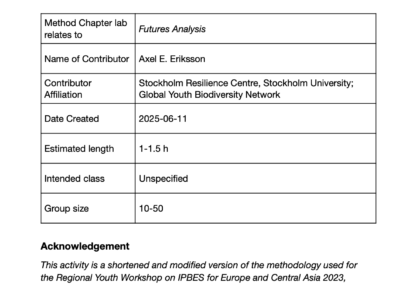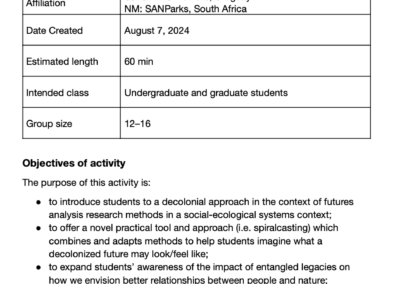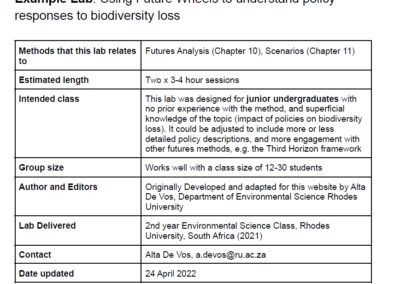This page deals with futures analysis methods that enable the imagination and generation of alternative images of futures that are yet to exist. The content on this page discusses scenarios and participatory scenario planning, futures wheels, the three horizons framework, design/experiential futures, horizon scanning, Delphi, trend impact analysis, emerging issues analysis, causal layered analysis, appreciative inquiry, gaming, future workshops, visioning, back-casting and road-mapping.
The Chapter summary video gives a brief introduction and summary of this group of methods, what SES problems/questions they are useful for, and key resources needed to conduct the methods. The methods video/s introduce specific methods, including their origin and broad purpose, what SES problems/questions the specific method is useful for, examples of the method in use and key resources needed. The Case Studies demonstrate the method in action in more detail, including an introduction to the context and issue, how the method was used, the outcomes of the process and the challenges of implementing the method. The labs/activities give an example of a teaching activity relating to this group of methods, including the objectives of the activity, resources needed, steps to follow and outcomes/evaluation options.
More details can be found in Chapter 10 of the Routledge Handbook of Research Methods for Social-Ecological Systems.
Chapter summary: Futures Analysis
Hichert, T. (2022)
Method Summaries
Three Horizons Method Summary
Hichert, T. (2022)
Futures Wheels Method Summary
Hichert, T. (2022)
Case Studies
Futures of human-nature relationships on the high seas: combining topic modelling with creative, structured futuring and science fiction storytelling
Luebker, H.M. (2022)
Using a Horizon Scan and Emerging Issue Analysis to investigate emerging national security risks to South Africa
Jacob, M., Duncker, L. & Goncalves, D. (2022)
Lab teaching/ activity
Tips and Tricks
- Bengston, D.N. 2017. Ten Principles for Thinking about the Future: A Primer for Environmental Professionals. Gen. Tech. Rep. NRS-175. Newtown Square: US Department of Agriculture, Forest Service, Northern Research Station. www.fs.usda.gov/treesearch/pubs/55548.
- Bengston, D.N. 2019. ‘Futures Research Methods and Applications in Natural Resources.’ Society and Natural Resources 32(10): 1099–1113. doi:10.1080/08941920.2018.1547852.
- Bishop, P.C., and A. Hines. 2012. Teaching about the Future. London: Palgrave Macmillan.
- Hichert, T., R. Biggs, and R. Preiser. 2019. Generating Visions of Good Anthropocenes: The Mānoa Mash-up Scenarios Methodology. CST Toolkit. University of Stellenbosch. http://www0.sun.ac.za/cst/publication/generating-visions-of-good-anthropocenes-the-manoa-mash-up-scenarios-methodology/
- UNDP Global Centre for Public Service Excellence. 2018. Foresight Manual: Empowered Futures for the 2030 Agenda.



